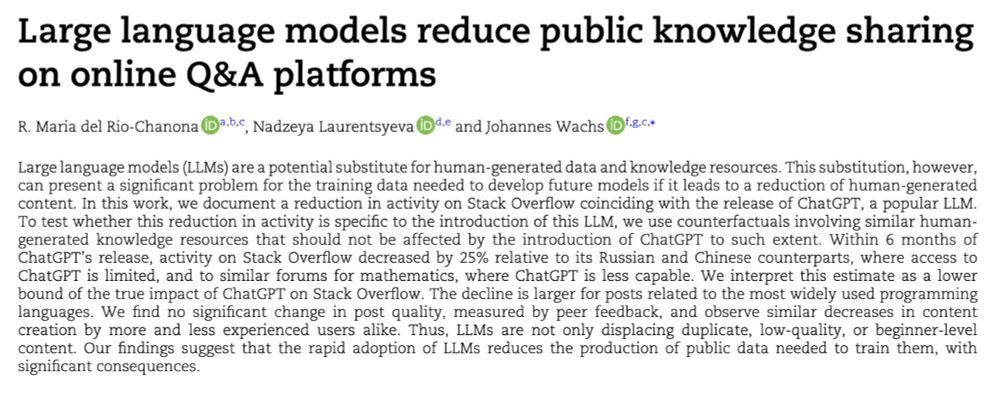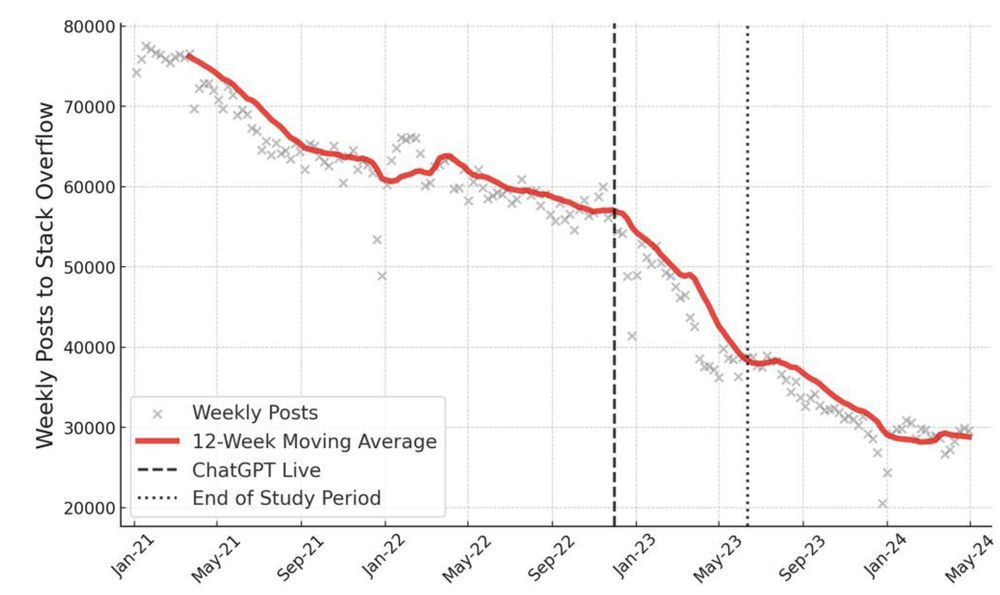
Johannes Wachs
@johanneswachs.bsky.social
Researching social computing, crowds, and networks at Corvinus University of Budapest and HUN-REN CERS.
More at: https://johanneswachs.com/
More at: https://johanneswachs.com/
Besides the adoption results, we find newer devs take up AI fastest. We see no gender gap. In fixed-effects models, higher user AI share predicts more commits, and the use of novel code libraries and library pairs. AI extends capabilities and supports exploration.

June 11, 2025 at 8:23 PM
Besides the adoption results, we find newer devs take up AI fastest. We see no gender gap. In fixed-effects models, higher user AI share predicts more commits, and the use of novel code libraries and library pairs. AI extends capabilities and supports exploration.
First we built an AI-code detector & gathered data to train it. Human code came from 2018 Python functions & HumanEval 21/23. To create AI-written code examples we had one LLM describe each human example in English then a 2nd LLM coded that description.

June 11, 2025 at 8:23 PM
First we built an AI-code detector & gathered data to train it. Human code came from 2018 Python functions & HumanEval 21/23. To create AI-written code examples we had one LLM describe each human example in English then a 2nd LLM coded that description.
How much code now comes from AI? With @simonedaniotti.bsky.social, @xfeng.bsky.social & Frank Neffke we estimate that by end-2024 30% of Python functions pushed by US devs on GitHub are AI-generated. Adoption is rapid but diffusion lags globally. How did we do it? arxiv.org/abs/2506.08945



June 11, 2025 at 8:23 PM
How much code now comes from AI? With @simonedaniotti.bsky.social, @xfeng.bsky.social & Frank Neffke we estimate that by end-2024 30% of Python functions pushed by US devs on GitHub are AI-generated. Adoption is rapid but diffusion lags globally. How did we do it? arxiv.org/abs/2506.08945
The published version of that preprint has a slightly longer descriptive time series in the discussion, see below. We can't extend the counterfactual (comparing SO vs Russian and Chinese platforms) because other LLMs came out.
academic.oup.com/pnasnexus/ar...
academic.oup.com/pnasnexus/ar...

February 14, 2025 at 8:36 PM
The published version of that preprint has a slightly longer descriptive time series in the discussion, see below. We can't extend the counterfactual (comparing SO vs Russian and Chinese platforms) because other LLMs came out.
academic.oup.com/pnasnexus/ar...
academic.oup.com/pnasnexus/ar...
We also find that most novel library imports and combinations are made by less-experienced users, suggesting how important new blood is for long-run ecosystem health.
Feedback warmly welcome!
Feedback warmly welcome!

November 25, 2024 at 12:20 PM
We also find that most novel library imports and combinations are made by less-experienced users, suggesting how important new blood is for long-run ecosystem health.
Feedback warmly welcome!
Feedback warmly welcome!
[Mirrors results on over 200 years of novelties in US patents by Youn et al: royalsocietypublishing.org/doi/full/10.... ].
Two implications for maintenance:
- single libraries will be widely used as ecosystems grow (see plot)
- the many co-used libraries need to stay compatible with each other
Two implications for maintenance:
- single libraries will be widely used as ecosystems grow (see plot)
- the many co-used libraries need to stay compatible with each other

November 25, 2024 at 12:20 PM
[Mirrors results on over 200 years of novelties in US patents by Youn et al: royalsocietypublishing.org/doi/full/10.... ].
Two implications for maintenance:
- single libraries will be widely used as ecosystems grow (see plot)
- the many co-used libraries need to stay compatible with each other
Two implications for maintenance:
- single libraries will be widely used as ecosystems grow (see plot)
- the many co-used libraries need to stay compatible with each other
New preprint on innovation in OSS /w Gabor Meszaros: arxiv.org/abs/2411.14894
We extract library import statements from Stack Overflow posts in 12 languages. These elementary building blocks of code appear at a slower rate as ecosystems grow. But novel combos of libraries grow linearly.
We extract library import statements from Stack Overflow posts in 12 languages. These elementary building blocks of code appear at a slower rate as ecosystems grow. But novel combos of libraries grow linearly.

November 25, 2024 at 12:20 PM
New preprint on innovation in OSS /w Gabor Meszaros: arxiv.org/abs/2411.14894
We extract library import statements from Stack Overflow posts in 12 languages. These elementary building blocks of code appear at a slower rate as ecosystems grow. But novel combos of libraries grow linearly.
We extract library import statements from Stack Overflow posts in 12 languages. These elementary building blocks of code appear at a slower rate as ecosystems grow. But novel combos of libraries grow linearly.
Our paper on the effect of ChatGPT on activity on @stackoverflow.com.web.brid.gy is out: academic.oup.com/pnasnexus/ar...
@maria-drc.bsky.social, Nadzeya Laurentsyeva & I find a 25% decrease in activity on SO within 6 months of #ChatGPT 's release vs counterfactuals.
Why does it matter?
@maria-drc.bsky.social, Nadzeya Laurentsyeva & I find a 25% decrease in activity on SO within 6 months of #ChatGPT 's release vs counterfactuals.
Why does it matter?


November 15, 2024 at 9:28 AM
Our paper on the effect of ChatGPT on activity on @stackoverflow.com.web.brid.gy is out: academic.oup.com/pnasnexus/ar...
@maria-drc.bsky.social, Nadzeya Laurentsyeva & I find a 25% decrease in activity on SO within 6 months of #ChatGPT 's release vs counterfactuals.
Why does it matter?
@maria-drc.bsky.social, Nadzeya Laurentsyeva & I find a 25% decrease in activity on SO within 6 months of #ChatGPT 's release vs counterfactuals.
Why does it matter?

